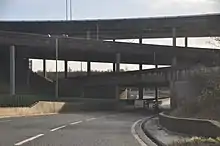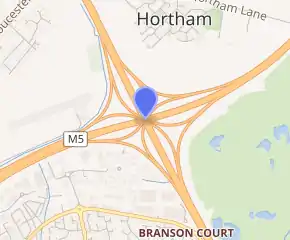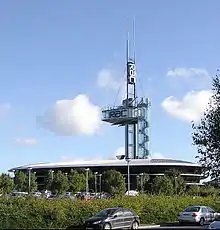Almondsbury Interchange
The Almondsbury Interchange in South Gloucestershire, is one of the United Kingdom's largest motorway stack interchanges. The interchange is one of only three four-level stacks in the UK, spanning a range (including slip roads) of 1 km by 1 km. It is the interchange for the M5 at junction 15 and M4 at junction 20, and is situated at the northern fringes of Bristol close to the village of Almondsbury, the Aztec West industrial estate, and Bradley Stoke. When it opened in 1966, it was the most complex junction on the British motorway network, a free-flowing interchange on four levels. Since then traffic volumes have increased and at busy periods, the Interchange becomes more difficult to negotiate safely. A managed motorway project has been introduced in an effort to relieve congestion.

| Almondsbury Interchange | |
|---|---|

| |
| Location | |
| Almondsbury, Gloucestershire | |
| Coordinates | 51°33′05″N 2°33′09″W |
| Roads at junction | |
| Construction | |
| Type | Stack interchange |
| Constructed | 1964 by Richard Costain Ltd |
| Opened | 8 September 1966 |
| Maintained by | Highways England |


The interchange
The Almondsbury Interchange is immediately adjacent to junction 16 of the M5, which allows traffic on and off the motorway from the A38 road running between Bristol and Gloucester. In fact, it is so close that the slip roads from the A38 junction intertwine with those from the M5/M4 interchange. Unusually within the UK motorway system, this forces multiple lane changes for vehicles traversing some of the routes. The centres of the junctions are at Ordnance Survey Grid References ST 617837 (M5 J15/ Almondsbury Interchange) and ST 606833 (M5 J16/ A38), and are therefore 1.2 km apart.[1]
Almondsbury Interchange was the first four-level interchange in the United Kingdom.[2] It was designed by Freeman Fox and Robert Earley.[3] When it opened in 1966, it was the most complex junction on the British motorway network.[4] The interchange was built by Richard Costain Ltd, with work commencing in May 1964. The bridge was opened by the Queen on 8 September 1966.[5]
Congestion
The interchange is often a traffic hot-spot, especially in the morning and evening rush hours.[6][4] It is overlooked by the RAC Tower. Traffic travelling northbound on the M5 from Portishead intending to use the Second Severn Crossing (or, in the opposite sense, vehicles eastbound on the crossing wishing to use the M5 southbound from Avonmouth onwards) can bypass the interchange by using the M49 motorway.[1]
Under normal conditions, traffic flows freely through the interchange. Congestion becomes a problem in heavy traffic flow because of the close proximity of the A38 junction to the Interchange. This makes the required changing of lanes when travelling west on the M5 much more problematic. The more vehicles there are, the harder it is to change lane, and when in the summer season of holiday traffic, the vehicles crawl along or grind to a halt, the surrounding sliproads can simultaneously become blocked, and this can make things even more difficult on the M5 for those wanting to change lane.[4]
The Interchange is at the centre of a managed motorway project which covers junctions 19 to 20 on the M4 and 15 to 17 on the M5. This became fully operational in January 2014, after being installed over a two-year period. It involves the use of the hard shoulders on the M4 and M5 over seven miles of motorway during busy times, at which time a variable speed limit function is activated. Thirty-three new overhead gantries have been installed to advise motorists on the speed limits applicable at the time. The system is being enforced by speed cameras, and there are six emergency refuge areas for motorists who get into difficulties.[7]
References
- "Sheet 172: Bristol & Bath" (Map). Landranger Series of Great Britain. Ordnance Survey.
- "Oldest, widest, longest, highest". The Motorway Archive. Archived from the original on 3 October 2007. Retrieved 4 October 2007.
- Baldwin, Peter; Robert Baldwin (2003). The Motorway Achievement. Thomas Telford. p. 406. ISBN 0-7277-3196-3.
- "Bad Junctions - Almondsbury Interchange". CBRD. Archived from the original on 11 May 2011. Retrieved 7 April 2011.
- "M4, Aust (J21) to Wickham (J14)". The Motorway Archive. Archived from the original on 8 October 2007. Retrieved 4 October 2007.
- "Almondsbury Interchange Safety Fence Upgrade". The Highways Agency. Archived from the original on 1 December 2008. Retrieved 5 August 2008.
- "M4 and M5 managed motorway project near Bristol is completed". BBC News Bristol. Retrieved 13 January 2015.
.svg.png.webp)